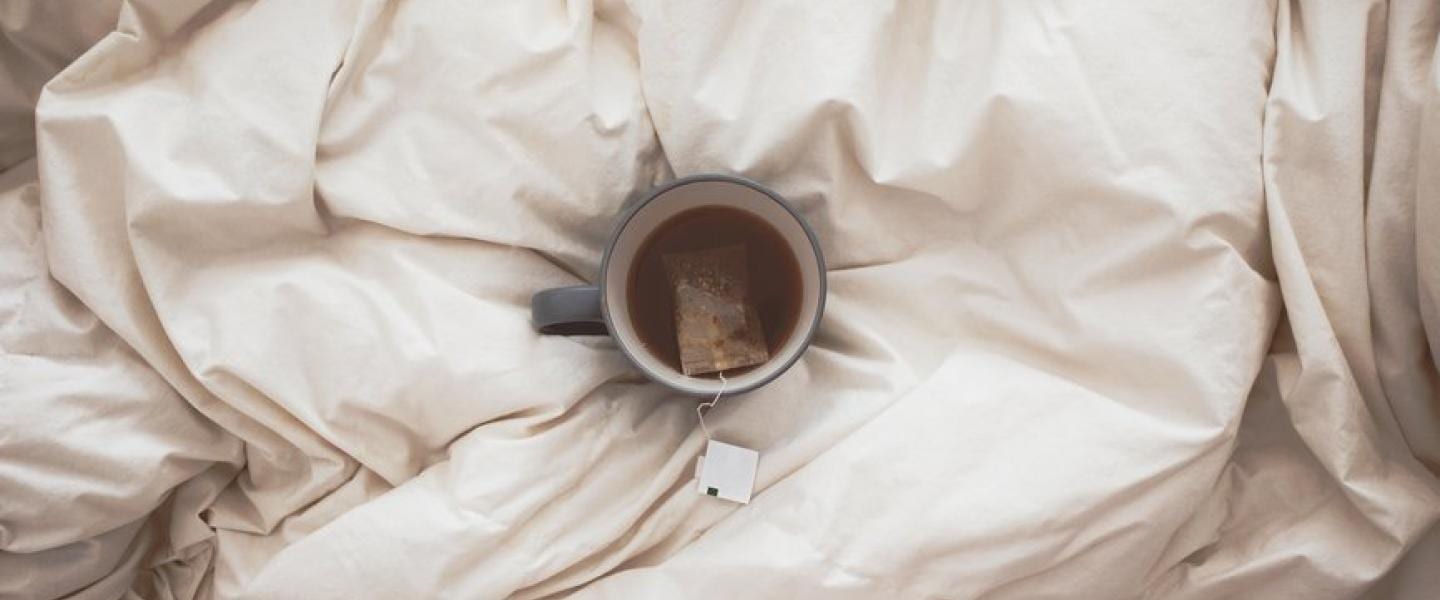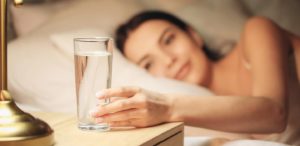When you buy through our links, we may earn a commission. Products or services may be offered by an affiliated entity. Learn more.
Does Warm Milk Help You Sleep?
If you struggle to obtain the recommended seven or more hours of sleep each night, you are not alone. One third of American adults report not receiving the recommended amount of sleep. Sleep is essential to good health and development, so it is imperative that we get enough each night.
There are a multitude of home remedies people may try to help themselves fall asleep more easily and sleep more soundly. Drinking warm milk at night to feel tired is one such strategy that has been shared for years. Learn what the research says about this habit, and if it helps promote sleep.
Does Warm Milk Help You Sleep?
Limited scientific evidence suggests that warm milk before bed may help you sleep. In a study of people staying in a hospital’s heart unit, those who drank warm milk and honey for three days noticed improvements in sleep. A study of adults over age 60 found that drinking fermented milk over the course of three weeks reduced nighttime wakings.
If you struggle with initiating sleep, milk might be able to help. In a study of people over 65, those who drank more milk and engaged in physical activity reported falling asleep more easily than those who did not.
Looking to improve your sleep? Try upgrading your mattress.
Why Does Warm Milk Make You Sleepy?
Milk’s sleep-promoting properties might be due to the amino acid tryptophan. Tryptophan-enriched foods have been shown to improve sleep and mood in the elderly.
Tryptophan plays an important role in the production of serotonin and melatonin. Serotonin is a neurotransmitter that impacts mood, cognitive reasoning, and memory. Melatonin is a hormone released by your body in response to darkness, in order to help you feel like sleeping at night.
Milk collected from cows milked at night contains ample amounts of melatonin in addition to tryptophan. Although only animal studies have been conducted with this night milk so far, it could make humans sleepier than regular milk does.
Is it Bad to Drink Milk Before Bed?
Drinking milk before bed does not appear to have documented negative side effects in most people. Some people, however, might want to avoid milk. For example, people who have a dairy allergy, are lactose intolerant, or have irritable bowel syndrome with symptoms that are worsened by dairy probably should not use milk to promote sleep. If you are avoiding milk, you may want to opt for non-dairy sleep-inducing foods instead.
Some may worry that drinking milk before bed could promote weight gain. However, research suggests a glass of milk at night could help promote fitness. One study found that drinking milk after a workout and before bed helps with muscle recovery. Another study found that drinking milk before bed increases a person’s resting metabolic rate, or how quickly they burn calories, the next morning.
Some sleepers may be concerned that drinking milk before bed could lead to snoring. However, contrary to popular belief, growing evidence suggests that drinking milk does not produce more mucus.
Tips for Better Sleep
For better sleep, it may help to try other foodshigh in tryptophan, such as:
- Cheese
- Chicken
- Turkey
- Fish
- Sunflower seeds
- Peanuts
- Pumpkin seeds
- Soy beans
If you have tried drinking milk or consuming other tryptophan-rich foods before bed and still struggle to fall asleep, you may want to take measures to improve your sleep hygiene.
- Set a Comfortable Temperature: While everyone’s ideal temperature is different, keep your room cool but not frigid. If you sleep with a partner, talk to them about a temperature you both agree on.
- Establish a Routine: Create and maintain a , so you wind down at the same time each night, including weekends.
- Avoid Certain Foods and Drinks: Avoid heavy meals, alcohol, and caffeine at least 2-3 hours before bed.
- Keep Your Bedroom Dark: Try light-blocking curtains or a sleep mask to ensure you aren’t being exposed to light during the night.
- Minimize Blue Light Exposure: Avoid watching TV or looking at a smartphone in the hours before bed.
- Exercise: Exercise regularly, preferably earlier in the day.
Consider talking to your doctor if you still are not getting enough sleep after improving your sleep hygiene. It may be due to an underlying sleep disorder, such as insomnia. Your doctor can help you reach a diagnosis, schedule a sleep study or prescribe medications.

Still have questions? Ask our community!
Join our Sleep Care Community — a trusted hub of sleep health professionals, product specialists, and people just like you. Whether you need expert sleep advice for your insomnia or you’re searching for the perfect mattress, we’ve got you covered. Get personalized guidance from the experts who know sleep best.
References
8 Sources
-
Fakhr-Movahedi, A., Mirmohammadkhani, M., & Ramezani, H. (2018). Effect of milk-honey mixture on the sleep quality of coronary patients: A clinical trial study. Clinical Nutrition ESPEN, 28, 132–135.
https://pubmed.ncbi.nlm.nih.gov/30390870/ -
Yamamura, S., Morishima, H., Kumano-go, T., Suganuma, N., Matsumoto, H., Adachi, H., Sigedo, Y., Mikami, A., Kai, T., Masuyama, A., Takano, T., Sugita, Y., & Takeda, M. (2009). The effect of Lactobacillus helveticus fermented milk on sleep and health perception in elderly subjects. European Journal Of Clinical Nutrition, 63(1), 100–105.
https://pubmed.ncbi.nlm.nih.gov/17851460/ -
Kitano, N., Tsunoda, K., Tsuji, T., Osuka, Y., Jindo, T., Tanaka, K., & Okura, T. (2014). Association between difficulty initiating sleep in older adults and the combination of leisure-time physical activity and consumption of milk and milk products: A cross-sectional study. BMC Geriatrics, 14, 118.
https://pubmed.ncbi.nlm.nih.gov/25407520/ -
Pawluski, J. L., Li, M., & Lonstein, J. S. (2019). Serotonin and motherhood: From molecules to mood. Frontiers in Neuroendocrinology, 53, 100742.
https://pubmed.ncbi.nlm.nih.gov/30878665/ -
dela Peña, I. J. I., Hong, E., de la Peña, J. B., Kim, H. J., Botanas, C. J., Hong, Y. S., Hwang, Y. S., Moon, B. S., & Cheong, J. H. (2015). Milk collected at night induces sedative and anxiolytic-like effects and augments pentobarbital-induced sleeping behavior in mice. Journal of Medicinal Food, 18(11), 1255–1261.
https://pubmed.ncbi.nlm.nih.gov/26501383/ -
Kim, J. (2020). Pre-sleep casein protein ingestion: New paradigm in post-exercise recovery nutrition. Physical Activity and Nutrition, 24(2), 6–10.
https://pubmed.ncbi.nlm.nih.gov/32698256/ -
Madzima, T. A., Melanson, J. T., Black, J. R., & Nepocatych, S. (2018). Pre-sleep consumption of casein and whey protein: Effects on morning metabolism and resistance exercise performance in active women. Nutrients, 10(9), 1273.
https://pubmed.ncbi.nlm.nih.gov/30201853/ -
Wüthrich, B., Schmid, A., Walther, B., & Sieber, R. (2005). Milk consumption does not lead to mucus production or occurrence of asthma. Journal of the American College of Nutrition, 24(6 Suppl), 547S–55S.
https://pubmed.ncbi.nlm.nih.gov/16373954/
























